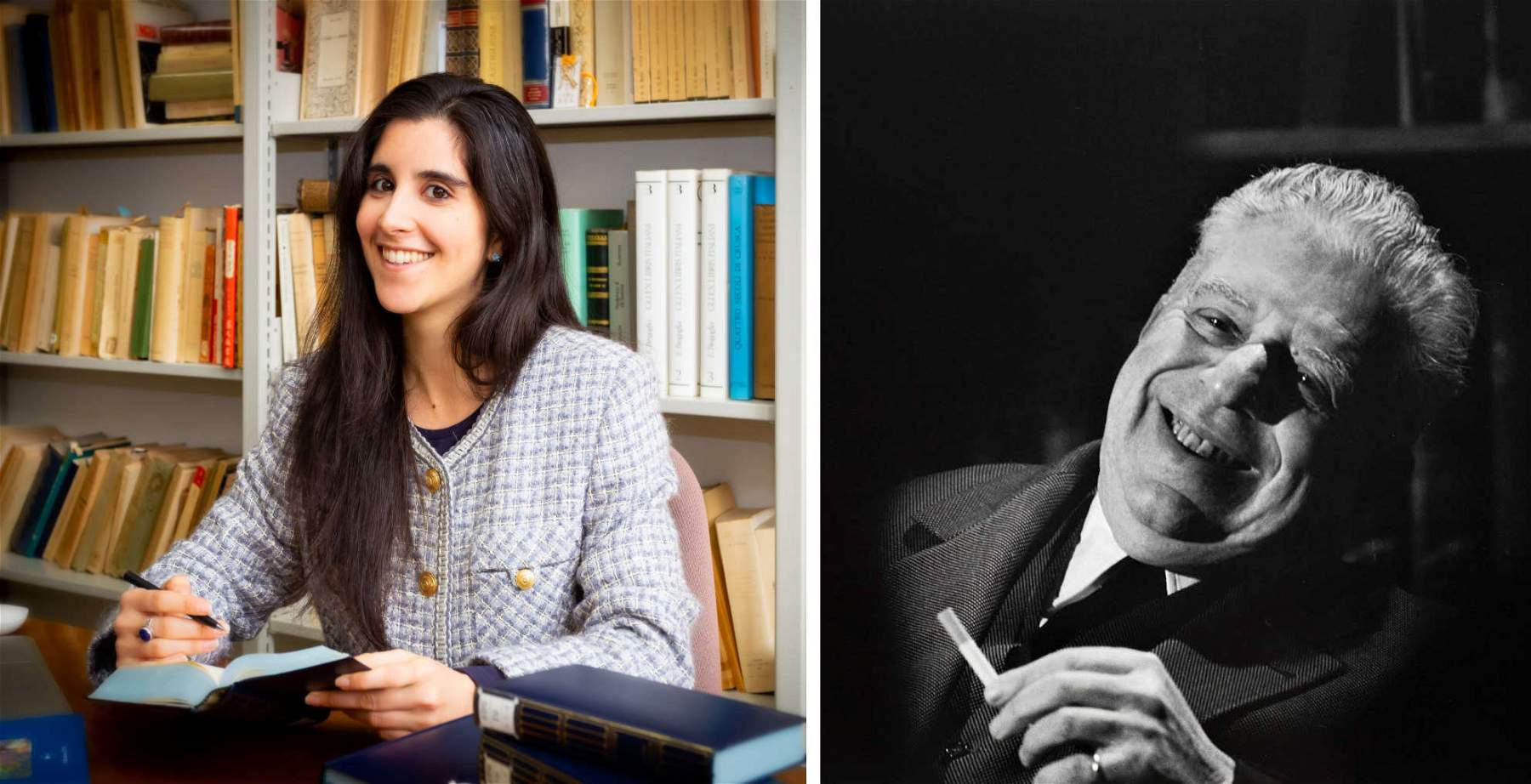Important discovery at the Pavia Manuscript Center, where an unpublished poem by Eugenio Montale (Genoa, 1896 - Milan, 1981) has been found. The author of the discovery is Ida Duretto, (pictured below) a young professor of Italian literature atKyoto University in Japan, where she moved just over a year ago after studying literature at the University of Pisa and furthering her studies at the Scuola Normale Superiore. Ida Duretto discovered the poem, dedicated to the environmentalist debate over theHotel Fuenti, one of the most notorious and debated ecomonsters in Italian history, during her research for the edition of the commentary to Other Verses and published it in the third issue of Quaderni montaliani (Interlinea, 2023) released this November. The term “ecomoster,” moreover, was coined by Legambiente precisely in reference to Hotel Fuenti.
The poem, typed on the back of a Montalian translation of Yeats, has several drafts: in the first ones the name of Elena Croce, the daughter of the philosopher Benedetto, writer and environmentalist, appears (so the first version reads: “Elena would like me to oppose / with all my might the imminent / disappearance of the splendid coastline / from Amalfi to Vietri where a skyscraper already stands / and more will follow / Skyscrapers rise / between Amalfi and Vietri, a reputed / Eden and dear Elena / would like me to rise / from the waist up like a Demosthenes / to order its demolition. / Even in the Aliscampi that join / Amalfi to Vietri loom and indeed / Between Amalfi and Vietri”).
The text critically addresses the construction of the so-called “Monster of Fuenti,” a huge illegal building built in the Fuenti locality in Vietri sul Mare, on the Amalfi Coast, in the 1970s. The hotel was at the center of a heated discussion (Antonio Cederna called it “an exemplary ecological misdeed”) that touched on issues of the protection of the natural environment: Elena Croce had probably tried to involve Montale in the project of a bill on the protection of cultural heritage precisely because of the construction of the hotel. Montale, moreover, had already taken a stand against the Hotel Fuenti, along with other intellectuals of the time such as Italo Calvino, Natalia Ginzburg, Indro Montanelli, Mario Soldati, and Franco Zeffirelli.
This composition of March 8, 1975, seems to be born out of this very solicitation: references toDante’s Inferno increase from one draft to the next, while the name of Elena Croce disappears, as Ida Duretto points out. The final version, with the handwritten title I grattacieli (Skyscrapers ), which follows the first deleted version, concludes with the bitter realization that the “high pietas” of the “intelligentsia” “will be wasted; scratching the sky / is what’s left for those who no longer believe / that a sky exists.”
This is the text:
It seems that sooner or later
indeed sooner than later
On the Aliscampi that shine
between Amalfi and Vietri one will see huge
skyscrapers and already rising from the waist up
The intelligentsia, with its lofty piates.
But they will be wasted; scratching the sky
Is what remains for those who no longer believe
That a heaven exists.
Duretto juxtaposes this poem with an early draft of The Heroism: “Elena would have me oppose,” the incipit of the first version of The Skyscrapers, recalls that “Clizia would have me engage” referring to political engagement in the Spanish Civil War. The hypothesis not ruled out by Duretto is that these compositions constituted a series on the impossibility of taking part in civilian life.
The Hotel Fuenti was eventually demolished, in 1999, and still represents a symbolic moment in the nascent debate, at the height of the economic boom, on the need to balance economic development with environmental protection (moreover, it was in 1975 that the Ministry of Cultural Heritage, established by Giovanni Spadolini, was born): Montale’s poem, in this sense, stands as a work with a decidedly pioneering flavor, which was composed in the same years in which, for example, Pasolini penned his writings in which he opposed the concept of “progress” to that of “development” and lashed out against consumer society, which he considered the true fascism of modern times.
 |
| Young scholar discovers unpublished Eugenio Montale poem: it is an environmentalist lyric |
Warning: the translation into English of the original Italian article was created using automatic tools. We undertake to review all articles, but we do not guarantee the total absence of inaccuracies in the translation due to the program. You can find the original by clicking on the ITA button. If you find any mistake,please contact us.